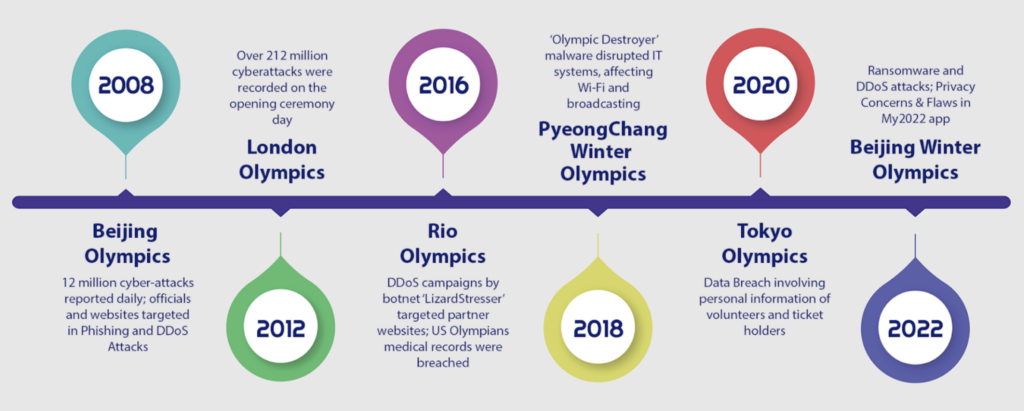Comprehensive Threat Exposure Management Platform
Hive Pro recognized in Gartner® Magic Quadrant™ for Exposure Assessment Platform, 2025 Watch platform in action
In recent years, the threat of cyberattacks has grown exponentially, affecting the sports sector as well. Major international events like the Olympics are prime targets for cybercriminals, hacktivists, and even nation-states. The reasons are clear: these events attract global attention, involve significant financial transactions, and rely on complex digital infrastructures. Moreover, France’s involvement in its geopolitical support for Ukraine and Palestine’s sovereignty has heightened tensions, making the event a potential target for politically motivated attacks. President Macron has expressed concerns about Russia’s potential to target the Olympics, emphasizing the need for heightened vigilance.
Historical precedents, such as the 2018 Olympic Destroyer attack, highlight the high likelihood of state-sponsored cyber espionage. The 2018 Olympic Destroyer attack targeted the Winter Olympics’ IT infrastructure in Pyeongchang, deploying sophisticated wiper malware that caused significant disruptions during the opening ceremony. The attack was notable for its use of false flags to obscure its origins, ultimately attributed to the Russian cyber espionage group Sandworm.
The Tokyo 2020 Olympics also experienced a surge in cyber threats, including phishing campaigns, ransomware attempts, and sophisticated efforts to breach critical systems. The purpose of these attacks is multifaceted, often aimed at disrupting critical systems, undermining public confidence, and causing chaos.
What we know for certain is that these attacks emphasized the persistent threat of attackers aiming to steal sensitive data, disrupt operations, and create a sense of insecurity.
Although the 2024 Olympics are still a month away, threat actors are ramping up their preparation, and scammers are actively engaging in social engineering activities to exploit the event. Cybercriminals are employing phishing emails and malware-laden messages to trick individuals into divulging personal and financial data.
Recent reports indicate heightened security concerns for the Paris 2024 Olympics, with significant threats including potential terror attacks, disruptions in response to the ongoing Gaza conflict, supply chain attacks, and specific warnings from ISIS about targeting the Eiffel Tower with drones. French authorities are intensifying security measures, focusing on both physical and cyber threats, and coordinating with international agencies to ensure the safety of athletes, spectators, and the public. The ongoing issue of antisemitism, highlighted by a recent attack on Jewish minors in a Paris suburb, adds to the broader security challenges facing the upcoming Games.
The history of the Olympic Games reveals a landscape marked by cyber incidents. From DDoS attacks disrupting online services during Beijing 2008 to the infamous “Olympic Destroyer” malware affecting PyeongChang 2018, each event has faced its share of digital challenges.

Cyber Attack Evolution Timeline on the Olympics
Historical attacks underscore the ongoing success of adversaries who majorly leverage basic techniques and relatively unsophisticated tools to achieve their objectives. Despite advancements in cybersecurity, these methods have proven effective, emphasizing the need for continued vigilance and adaptation in defending against cyber threats.
Ransomware Attacks: Ransomware, which locks users out of their systems until a ransom is paid, could disrupt the smooth running of the Games. Critical systems, from ticketing to communications, could be affected.
The cybersecurity preparations for Paris 2024 cover several critical areas:
Cybersecurity has emerged as a top priority for organizers, with the Paris 2024 council collaborating closely with the French Defense and military, alongside the National Cyber Agency, to implement leading cybersecurity practices. Eviden and Cisco are supporting cyber security initiatives and have been engaged as official Cyber Security Partners. They are conducting Ethical Hacking programs to detect flaws early, and are implementing AI-driven capabilities for threat detection and mitigation. Their comprehensive security framework includes rigorous incident response tests and regular business continuity drills to ensure smooth operational continuity. Organizations are further encouraged to adopt below additional measures to mitigate the risk of cyber threats linked to the Paris Olympics.
The Paris Olympics 2024 represents a significant opportunity to showcase not only athletic excellence but also cutting-edge cybersecurity practices. As cyber threats continue to evolve, the measures taken to protect this global event will set new standards for future international gatherings. By prioritizing cybersecurity, the Paris 2024 organizers are not just safeguarding the event but also contributing to a safer digital world.
In the end, the success of the Paris Olympics 2024 will be measured not only by the records broken and the medals won but also by the resilience of its cybersecurity defenses. This proactive approach ensures that the focus remains on the athletes and the spirit of the games, rather than on the shadows of cyber threats.